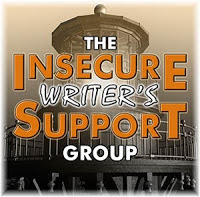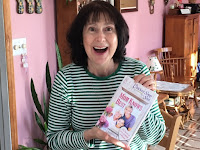Wait! You
mean without the family constantly interrupting me, wanting their piece of my
time? You mean not feeling like I’m wasting precious time writing because no readers
are waiting for my stories? Wow! Let’s see… It’s not like I want to be stranded
on a deserted island with internet hook-up and a fresh pot of hot tea and scones or anything,
but a little uninterrupted thinking time would be great. And maybe if I could
just stop comparing myself to other writers who seem to have an infinite amount
of time to complete stories that people are waiting to read, and have infinite
time to do social media.
But if I were “living the dream” of
a prolific, published writer, I’d probably have an assistant who was tech savvy
to help me keep up with social media and marketing. I’d have an editor and/or
agent whom I trusted with my newborn stories and memoirs, who would understand
my concreteness in concepts and who would continuously affirm that I was on the
right path and that I could complete my next story. I’d enjoy the satisfaction
of knowing that whatever I was working on would, in fact, get published.
And who knows? I might even have
someone to field all the questions and calls from family and friends while I’m
working on my next story to be sure I only need to answer the desperate ones. I
might even find someone to help out around the home and gardens while I wrote.
Ahh…in the words of Eliza Doolittle, “wouldn’t it be lovely”?
But as it is, you dear followers and
commenters, you are my assistants, my sound writing and tech savvy advisors. While
I write and pray that what I have written will sell, I turn to you all for
advice. And I trust all of you to share your experiences with me.
So, could anyone
advise me about getting a short story ebook published? These are YA stories, about
1,800 words, where I assume I need pictures that either I create [Yikes!] or
have created for the story. Could anyone suggest a reputable online ebook provider
for me to check out?
Eventually, I’d
like to make a hard copy collection of short YA stories. Perhaps I’ll start
with traditional publishing for the hard copy. I don’t have that infinite
following or social media groups. Any advice on either of these endeavors? Feel
free to leave links that might be helpful for me in your comment.
I’ll be interested to see how
you’ve tackled this month’s question. It’s great having a topic to share our
thoughts on each month. And I am extremely thankful for all of you for being my
sounding board and advisors in this writing and publishing game.
Thanks so much for visiting!
Please follow Adventures in Writing if you haven’t already and connect with me
online. Leave your blog link in your
comment so I can be sure to do the same for you.
This post was written for the
Insecure Writer’s Support Group. We post on the first Wednesday of every month.
To join us, or learn more about the group, click HERE.


















